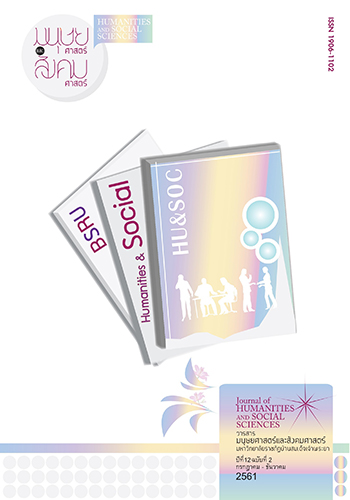Values Reflected through Meanings of Nicknames among Thais of Chinese Descent Aged 50-70 Years in Hat Yai District, Songkhla Province
Keywords:
Nickname, Thais of Chinese decent, Hat Yai DistrictAbstract
The objective of this research article is to present the results of a study on values reflected through meanings of nicknames among Thais of Chinese descent aged between 50 and 70 years in Hat Yai District, Songkhla Province. Purposive sampling method was employed to select 100 subjects consisting of 50 males and 50 females aged 50-70 years. The instrument was a questionnaire about nicknames given to Thais of Chinese descent. The data were analyzed and presented in percentages. The study results revealed that the meanings of nicknames were in 14 themes from most to least frequently found as follows: 1) Nature (20 percent), followed by 2) Physical characteristics (16 percent); 3) Wealth (14 percent); 4) Nicknames without meaning (8 percent); Happiness and love (6 percent) which was the same percentage as 6) Alphabets, numbers and ordinal numbers (6 percent), and the same percentage as 7) Foods (6 percent); 8) Goodness and prosperity (4 percent); 9) People and family (4 percent) which was the same percentage as 10) Knowledge, ability, and technology (4 percent), 11) Things, tools, and vehicles (4 percent), and 12) Nicknames with unknown meanings (4 percent); 13) Honor, fame, and authority was found the least frequent at 2 percent which was the same percentage as 14) Nicknames related to specific names (2 percent).
References
คนพันธุ์ N. (2561). ‘ทัศนคติ’ ความหมายและความสำคัญ. ค้นเมื่อวันที่ 18 กันยายน 2561. จาก http://www.bangkokbiznews.com/blog/detail/634487
จรัญวิไล จรูญโรจน์, ม.ล. (2552). รายงานการวิจัยเรื่อง ภาษาและภาพสะท้อนของวัฒนธรรมจากชื่อเล่นของคนไทย. กรุงเทพฯ : คณะมนุษยศาสตร์ มหาวิทยาลัยเกษตรศาสตร์.
นฤมล รัตน์อ่อน. (2554). ความหมาย ความเชื่อ และค่านิยม ที่สะท้อนจากการตั้งชื่อนักเรียน ตำบลช้างคล้อง จังหวัดเลย. ปริญญานิพนธ์ศิลปศาสตรมหาบัณฑิต สาขาวิชาภาษาไทย มหาวิทยาลัยศรีนครินทรวิโรฒ
ภูวดล ทรงประเสริฐ. (2535). ทุนสิงคโปร์ : การผูกขาดตลาดยางพาราและดีบุกไทย. กรุงเทพฯ : สถาบันเอเชียศึกษา จุฬาลงกรณ์มหาวิทยาลัย.
วงค์เดือน ภาณุวัฒนากูล และสุรพงษ์ ยิ้มละมัย. (2553, มกราคม - มิถุนายน). อัตลักษณ์ของคนไทยเชื้อสายจีนในเมืองหาดใหญ่. ว.ศิลปศาสตร์มหาวิทยาลัยสงขลานครินทร์ วิทยาเขตหาดใหญ่. 2(1), 26-41.
วิยดา วรธนานันท์. (2557). บทวิทยุกระจายเสียง. ค้นเมื่อวันที่ 1 กันยายน 2561. จาก http://www.stou.ac.th/study/sum rit/6-60/page1-6-60.html
ศิริกุล กิติธรากุล. (2539). ความสัมพันธ์ระหว่างความใกล้ชิดชุมชนกับการเลือกใช้ศัพท์ของชุทชนลาวครั่งที่บ้านหนองกระพี้ ตำบลบ้านหลวง อำเภอดอนตูม จังหวัดนครปฐม. วิทยานิพนธ์อักษรศาสตรมหาบัณฑิต สาขาวิชาภาษาศาสตร์ จุฬาลงกรณ์มหาวิทยาลัย.
สมชาย สำเนียงงาม. (2545). ลักษณะภาษาที่แสดงการเปลี่ยนแปลงของความเชื่อเกี่ยวกับสิริมงคลและกาลกิณีในชื่อของคนไทย. วิทยานิพนธ์อักษรศาสตรดุษฎีบัณฑิต สาขาวิชาภาษาไทย จุฬาลงกรณ์มหาวิทยาลัย.
สมบูรณ์ ตันยะ. (2542). ค่านิยมการศึกษาของไทย. นครราชสีมา : รายงานการวิจัยคณะครุศาสตร์ สถาบันราชภัฏนครราชสีมา.
อมรา ประสิทธิ์รัฐสินธุ์. (2550). ภาษาศาสตร์สังคม. (พิมพ์ครั้งที่ 4). กรุงเทพฯ : โรงพิมพ์แห่งจุฬาลงกรณ์มหาวิทาลัย.
อุษณีย์ โฉมฉายแสง. (2557). ค่านิยมที่ปรากฏในการตั้งชื่อ. ค้นเมื่อวันที่ 16 พฤศจิกายน 2561. จาก http://www.stou.ac.th/study/sumrit/6-60/page1-6-60.html
Ma Guitong. (2554). ศึกษาอัตลักษณ์ชาวไทยเชื้อสายจีนฮากกา ในเขตเทศบาลนครหาดใหญ่ จังหวัดสงขลา. ว.มนุษยศาสตร์สังคมศาสตร์มหาวิทยาลัยทักษิณ. 6(1), 195-218.
RANSNUK. (2561). ชื่อ นามสกุลของคนไทยกับพัฒนาการของสังคมที่เปลี่ยนไป (ตอนที่ 2). ค้นเมื่อวันที่ 16 พฤศจิกายน 2561. จาก https://www.ransnuk.com/view/
Downloads
Published
How to Cite
Issue
Section
License

This work is licensed under a Creative Commons Attribution-NonCommercial-NoDerivatives 4.0 International License.




